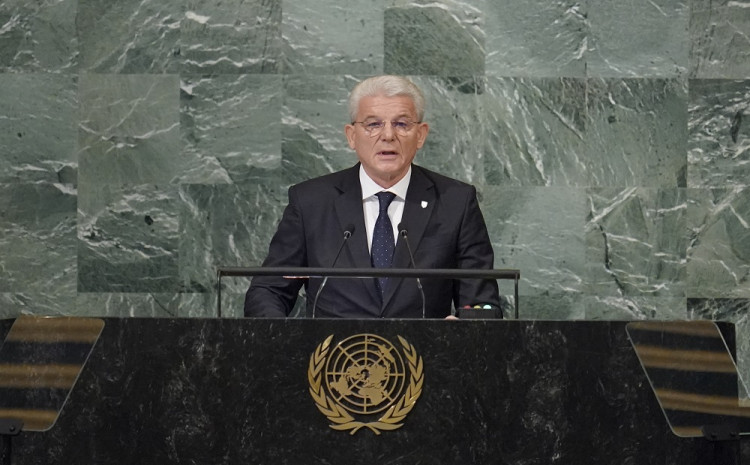Chairman of the Presidency of Bosnia and Herzegovina, Šefik Džaferović, addressed the United Nations General Assembly in New York today, and in his address he spoke about the current situation in the country, as well as regional and international relations.
As he stated, the war in Ukraine, as well as the consequences of the coronavirus pandemic, have led to huge changes in all spheres of life, and this is mostly expressed through the deep energy crisis, inflation, the overall recession and the threat of supply, especially when it comes to food.
- Globalization has made us interdependent by tightly connecting various parts of the globe. Strong economic, security and political interrelations have produced an increasingly integrated global framework, in which everyone relies on each other, in various spheres, from economy to security - he added.
Source of vulnerability
At the same time, interdependence of different parts of the world is the source of vulnerability of the global community. This was shown by the pandemic, when traffic and supply channels were blocked. This is also shown by the current crisis, related to the war in Ukraine, says Džaferović.
Speaking about Bosnia and Herzegovina, he underlined that BiH has been home to many nations, cultures and religions for centuries, but BiH as a meeting place of cultures has been a thorn in the side of politics, which are based on the idea of the impossibility of living together and the necessity of confrontation.
Such policies led to a terrifying war in Bosnia and Herzegovina, from 1992 to 1995, which culminated in the genocide in Srebrenica, and since the signing of the Dayton Peace Agreement, Bosnia and Herzegovina has gone through an arduous path in building peace.
- There are still numerous challenges, the biggest of which are the policies in Bosnia and Herzegovina and the neighborhood, which have not given up on the war goals of dividing the country. As part of a broader wave of right-wing populism in Europe, there are politicians in Bosnia and Herzegovina who openly claim that Bosnia and Herzegovina is not possible, because they claim that it is not possible for Muslims and Christians to live together - warned Džaferović.
However, Džaferović emphasizes that Bosnia and Herzegovina, with its centuries-long history, is a living example and proof of the civilizational idea that people of different religions, nations and cultures can live together, and despite the war that was aimed at its destruction, Bosnia and Herzegovina managed to survive, which shows its exceptional resilience.
EUFOR and NATO forces
The experience of Bosnia and Herzegovina shows that the rule of law is a crucial factor for building peace, says Džaferović, and other bodies of the international community, primarily the Office of the High Representative and the Peace Implementation Council, have made a huge contribution to building and protecting peace.
- In the past little more than a year, in Bosnia and Herzegovina there was an attack on the 27 years of implementation of the Dayton Peace Agreement, through an attempt to dissolve the state institutions that were established based on the clear provisions of the Dayton Agreement - he reminded.
However, thanks to the action of the Office of the High Representative and member states of the Peace Implementation Council, led by the United States of America, the attack on state institutions was stopped, and peace was preserved, thus demonstrating the expediency and efficiency of the institutions of the international community in BiH.
He emphasized that in less than a month the UN Security Council will vote on the extension of mandate of EUFOR, stressing that it is very important for peace and stability in BiH and the region that this resolution be adopted, but also added that in every case, the NATO alliance, according to the Dayton Agreement, has the right and obligation to deploy its forces in Bosnia and Herzegovina.
There are also decisions of the Presidency of Bosnia and Herzegovina which give consent to the presence of EUFOR and NATO forces, without a time limit, and these decisions are a sufficient legal basis for the presence of an international military mission in BiH, until the Presidency of BiH takes a different position.
Foreign policy goals of Bosnia and Herzegovina
In his address to the UN General Assembly, Chairman Džaferović reiterated that the foreign policy goals of Bosnia and Herzegovina are membership in the European Union and the NATO alliance, and he expressed the expectation that after the general elections that will be held on October 2 this year, BiH will continue on that path, to get the status of a candidate for EU membership as soon as possible.
When it comes to relations with the NATO alliance, Bosnia and Herzegovina is part of the Action Plan for membership. The Presidency of Bosnia and Herzegovina adopted the Reform Program, with which Bosnia and Herzegovina fulfills its obligations, on an annual level, when it comes to the reforms that the NATO alliance expects from us, as an aspirant state.
He underlined that everyone in the region must understand that geostrategic and geopolitical configuration of the region is complete, and that the path to security and prosperity is the path of mutual cooperation and solving open issues, in accordance with the principles of international law, stressing that everyone in the region is equal, no one cannot dominate anyone, and peace and stability are very necessary for everyone.
- The whole world needs peace and stability. All current disputes in the world should be resolved on the principles of international law and with the participation of international justice institutions. That is why it is very important to strengthen multilateral mechanisms and institutions. In this sense, I believe that the strength and authority of the UN as a key multilateral mechanism must be strengthened - concluded Džaferović.
